L-Glutamin
Filter
-
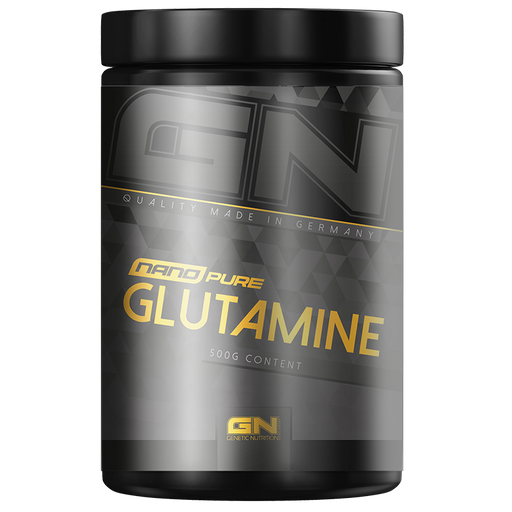 Jetzt 0% sparen
Jetzt % sparen
Original-Preis €24,90 - Original-Preis €24,90Original-Preis €24,90€24,90€24,90 - €24,90Aktueller Preis €24,90|/
Jetzt 0% sparen
Jetzt % sparen
Original-Preis €24,90 - Original-Preis €24,90Original-Preis €24,90€24,90€24,90 - €24,90Aktueller Preis €24,90|/Nano Pure Glutamine · 500g
GN Laboratories17 reviewsGlutamin ist eine Aminosäure, die im menschlichen Körper für viele Prozesse eine entscheidende Rolle spielt. Sie trägt zum Muskelaufbau bei und hat...
Vollständige Details anzeigenOriginal-Preis €24,90 - Original-Preis €24,90Original-Preis €24,90€24,90€24,90 - €24,90Aktueller Preis €24,90|/Jetzt 0% sparen Jetzt % sparen -
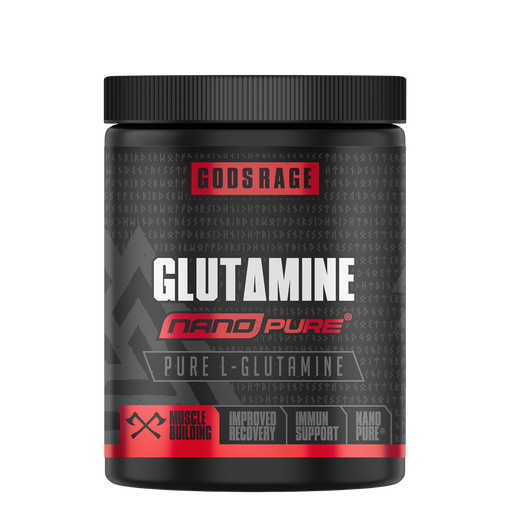 Jetzt 0% sparen
Jetzt % sparen
Original-Preis €24,90 - Original-Preis €24,90Original-Preis €24,90€24,90€24,90 - €24,90Aktueller Preis €24,90|/
Jetzt 0% sparen
Jetzt % sparen
Original-Preis €24,90 - Original-Preis €24,90Original-Preis €24,90€24,90€24,90 - €24,90Aktueller Preis €24,90|/Glutamine NanoPure® · 500g
Gods Rage22 reviewsDer heilende Trank, der Deine Regeneration nach harten und erbarmungslosen Kämpfen im Kraftraum beschleunigen und Deine verletzten Muskeln heilen w...
Vollständige Details anzeigenOriginal-Preis €24,90 - Original-Preis €24,90Original-Preis €24,90€24,90€24,90 - €24,90Aktueller Preis €24,90|/Jetzt 0% sparen Jetzt % sparen -
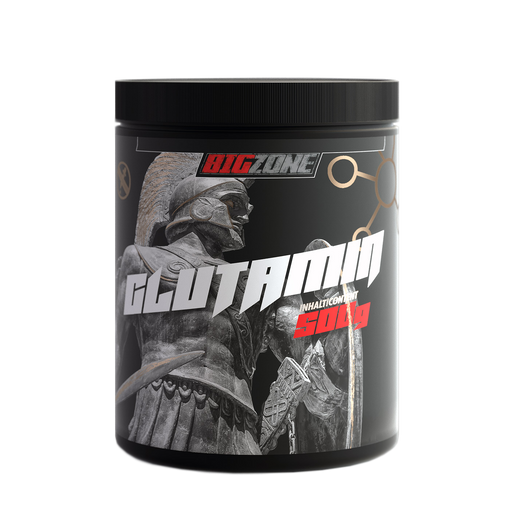 Ausverkauft
Original-Preis €22,90 - Original-Preis €22,90Original-Preis €22,90€22,90€22,90 - €22,90Aktueller Preis €22,90|/
Ausverkauft
Original-Preis €22,90 - Original-Preis €22,90Original-Preis €22,90€22,90€22,90 - €22,90Aktueller Preis €22,90|/Glutamin · 500g
Big Zone1 review100% reines L-Glutamin Micronized Quality Made in Germany Nicht nur Kraftsportler sind begeistert!
Original-Preis €22,90 - Original-Preis €22,90Original-Preis €22,90€22,90€22,90 - €22,90Aktueller Preis €22,90|/Ausverkauft -
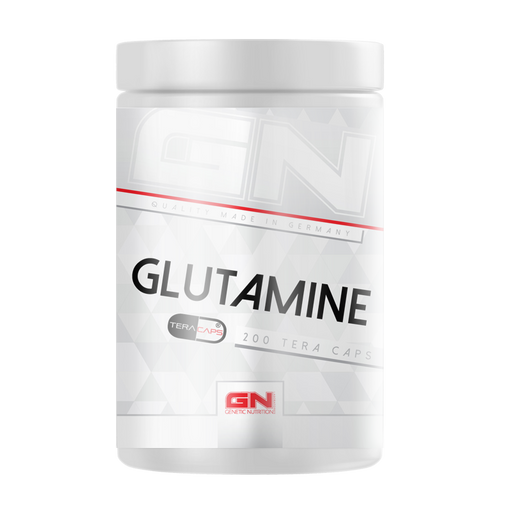 Jetzt 11% sparen
Jetzt % sparen
Original-Preis €22,90Original-Preis €22,90 - Original-Preis €22,90Original-Preis €22,90Aktueller Preis €20,38€20,38 - €20,38Aktueller Preis €20,38|/
Jetzt 11% sparen
Jetzt % sparen
Original-Preis €22,90Original-Preis €22,90 - Original-Preis €22,90Original-Preis €22,90Aktueller Preis €20,38€20,38 - €20,38Aktueller Preis €20,38|/Glutamine Tera Caps · 200 Kapseln
GN Laboratories6 reviewsReines Glutamin für eine bessere Regeneration, einen schnelleren Muskelaufbau und eine bessere Funktion des Immunsystems – Jetzt in Form von innova...
Vollständige Details anzeigenOriginal-Preis €22,90Original-Preis €22,90 - Original-Preis €22,90Original-Preis €22,90Aktueller Preis €20,38€20,38 - €20,38Aktueller Preis €20,38|/Jetzt 11% sparen Jetzt % sparen -
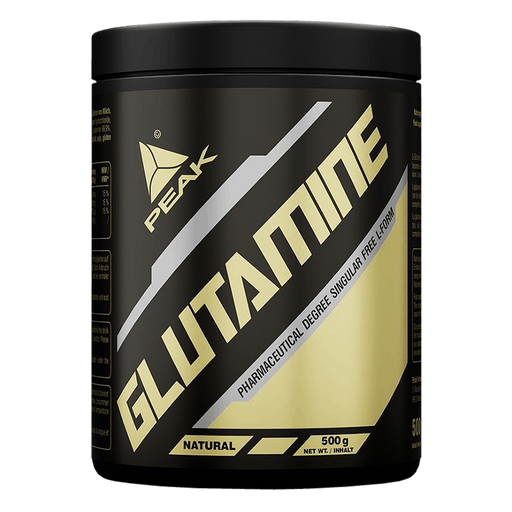 Jetzt 0% sparen
Jetzt % sparen
Original-Preis €21,90 - Original-Preis €21,90Original-Preis €21,90€21,90€21,90 - €21,90Aktueller Preis €21,90|/
Jetzt 0% sparen
Jetzt % sparen
Original-Preis €21,90 - Original-Preis €21,90Original-Preis €21,90€21,90€21,90 - €21,90Aktueller Preis €21,90|/Glutamin · 500g
PEAK1 reviewReinstes L-Glutamin in Pulverform mit B-Vitaminen 9900 mg freies Glutamin pro Portion Ideal bei hohen Belastungen Empfehlenswert bei Diäten Vitami...
Vollständige Details anzeigenOriginal-Preis €21,90 - Original-Preis €21,90Original-Preis €21,90€21,90€21,90 - €21,90Aktueller Preis €21,90|/Jetzt 0% sparen Jetzt % sparen -
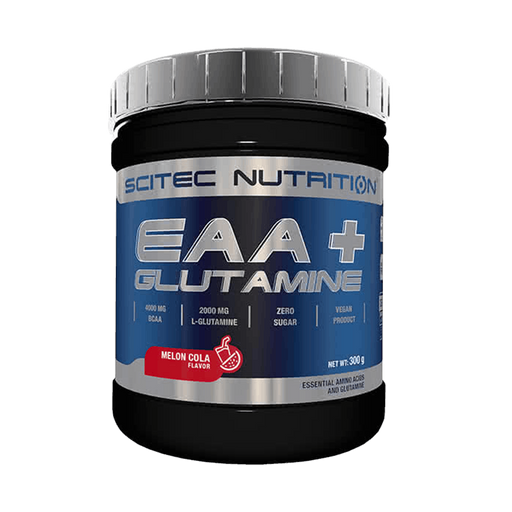 Jetzt 0% sparen
Jetzt % sparen
Original-Preis €22,90 - Original-Preis €22,90Original-Preis €22,90€22,90€22,90 - €22,90Aktueller Preis €22,90|/
Jetzt 0% sparen
Jetzt % sparen
Original-Preis €22,90 - Original-Preis €22,90Original-Preis €22,90€22,90€22,90 - €22,90Aktueller Preis €22,90|/EAA + Glutamine · 300g
SCITEC Nutrition2 reviewsDas Produkt enthält 4250 mg EAAs (inkl. BCAAs) und 2000 mg L-Glutamin. Es enthält kein Zucker und ist damit auch für zuckerfreie Diäten geeignet. ...
Vollständige Details anzeigenOriginal-Preis €22,90 - Original-Preis €22,90Original-Preis €22,90€22,90€22,90 - €22,90Aktueller Preis €22,90|/Jetzt 0% sparen Jetzt % sparen -
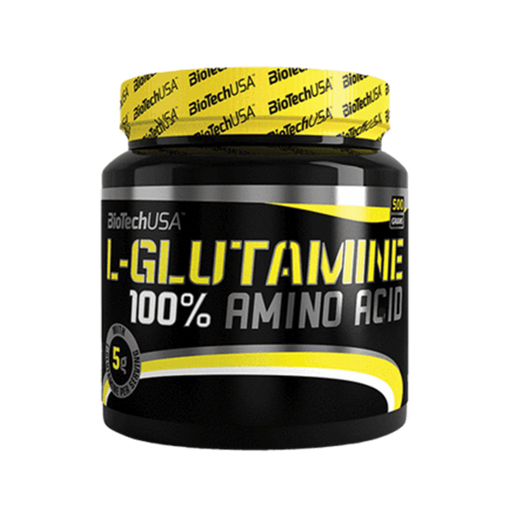 Jetzt 0% sparen
Jetzt % sparen
Original-Preis €21,90 - Original-Preis €21,90Original-Preis €21,90€21,90€21,90 - €21,90Aktueller Preis €21,90|/
Jetzt 0% sparen
Jetzt % sparen
Original-Preis €21,90 - Original-Preis €21,90Original-Preis €21,90€21,90€21,90 - €21,90Aktueller Preis €21,90|/100% L-Glutamine · 500g
Biotech USA2 reviewsPharmazeutisch reines Aminosäureprodukt Fördert den Muskelaufbau und die Kondition Kann vor oder nach dem Training eingenommen werden Besteht aus ...
Vollständige Details anzeigenOriginal-Preis €21,90 - Original-Preis €21,90Original-Preis €21,90€21,90€21,90 - €21,90Aktueller Preis €21,90|/Jetzt 0% sparen Jetzt % sparen -
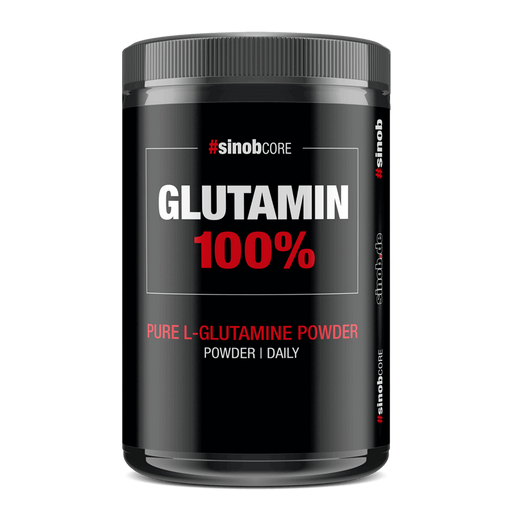 Jetzt 0% sparen
Jetzt % sparen
Original-Preis €22,90 - Original-Preis €22,90Original-Preis €22,90€22,90€22,90 - €22,90Aktueller Preis €22,90|/
Jetzt 0% sparen
Jetzt % sparen
Original-Preis €22,90 - Original-Preis €22,90Original-Preis €22,90€22,90€22,90 - €22,90Aktueller Preis €22,90|/Core L-Glutamin · 500g
#sinob2 reviewsWesentliche Unterstützung in Stressphasen: Core Glutamin hilft bei der Reduktion von Muskelabbau und fördert die Regeneration bei Verletzungen od...
Vollständige Details anzeigenOriginal-Preis €22,90 - Original-Preis €22,90Original-Preis €22,90€22,90€22,90 - €22,90Aktueller Preis €22,90|/Jetzt 0% sparen Jetzt % sparen -
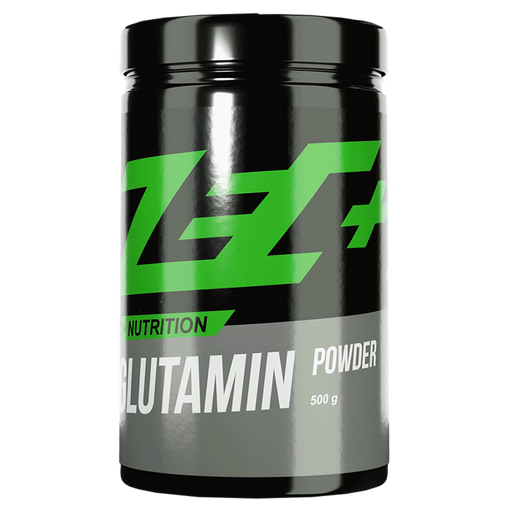 Jetzt 0% sparen
Jetzt % sparen
Original-Preis €22,90 - Original-Preis €22,90Original-Preis €22,90€22,90€22,90 - €22,90Aktueller Preis €22,90|/
Jetzt 0% sparen
Jetzt % sparen
Original-Preis €22,90 - Original-Preis €22,90Original-Preis €22,90€22,90€22,90 - €22,90Aktueller Preis €22,90|/Glutamin · 500g
Zec+No reviewsEssentielle Aminosäuren-Kombination: Glutamin und BCAAs unterstützen effektiv den Muskelaufbau und die Regeneration. Stabilisiert Glutamin-Spieg...
Vollständige Details anzeigenOriginal-Preis €22,90 - Original-Preis €22,90Original-Preis €22,90€22,90€22,90 - €22,90Aktueller Preis €22,90|/Jetzt 0% sparen Jetzt % sparen -
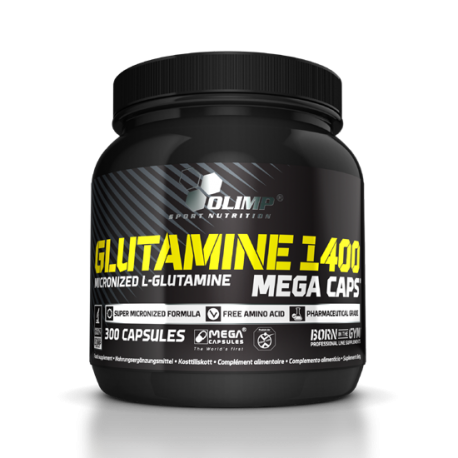 Jetzt 11% sparen
Jetzt % sparen
Original-Preis €34,90Original-Preis €34,90 - Original-Preis €34,90Original-Preis €34,90Aktueller Preis €31,06€31,06 - €31,06Aktueller Preis €31,06|/
Jetzt 11% sparen
Jetzt % sparen
Original-Preis €34,90Original-Preis €34,90 - Original-Preis €34,90Original-Preis €34,90Aktueller Preis €31,06€31,06 - €31,06Aktueller Preis €31,06|/Glutamine 1400 Mega Caps · 300 Kapseln
Olimp Sport Nutrition1 reviewOlimp Glutamine 1400 Mega Caps ist ein Nahrungsergänzungsmittel mit L-Glutamin. Das L-Glutamin ist in einer reinen und hoch mikronisierten Form en...
Vollständige Details anzeigenOriginal-Preis €34,90Original-Preis €34,90 - Original-Preis €34,90Original-Preis €34,90Aktueller Preis €31,06€31,06 - €31,06Aktueller Preis €31,06|/Jetzt 11% sparen Jetzt % sparen -
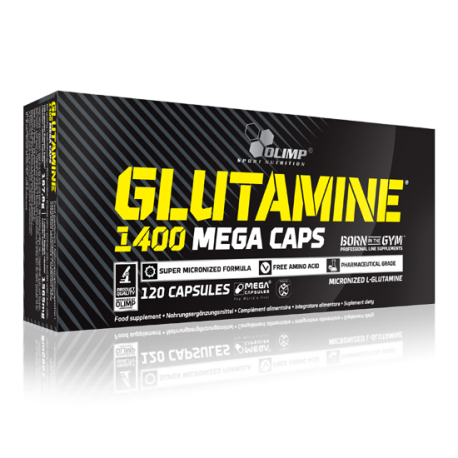 Jetzt 11% sparen
Jetzt % sparen
Original-Preis €16,90Original-Preis €16,90 - Original-Preis €16,90Original-Preis €16,90Aktueller Preis €15,04€15,04 - €15,04Aktueller Preis €15,04|/
Jetzt 11% sparen
Jetzt % sparen
Original-Preis €16,90Original-Preis €16,90 - Original-Preis €16,90Original-Preis €16,90Aktueller Preis €15,04€15,04 - €15,04Aktueller Preis €15,04|/Glutamine 1400 Mega Caps · 120 Kapseln
Olimp Sport NutritionNo reviewsGlutamine 1400 Mega Caps enthält wichtiges Glutamin für Regeneration und Muskelaufbau. Glutamin ist eine bedingt essentielle Aminosäure. Intensive...
Vollständige Details anzeigenOriginal-Preis €16,90Original-Preis €16,90 - Original-Preis €16,90Original-Preis €16,90Aktueller Preis €15,04€15,04 - €15,04Aktueller Preis €15,04|/Jetzt 11% sparen Jetzt % sparen -
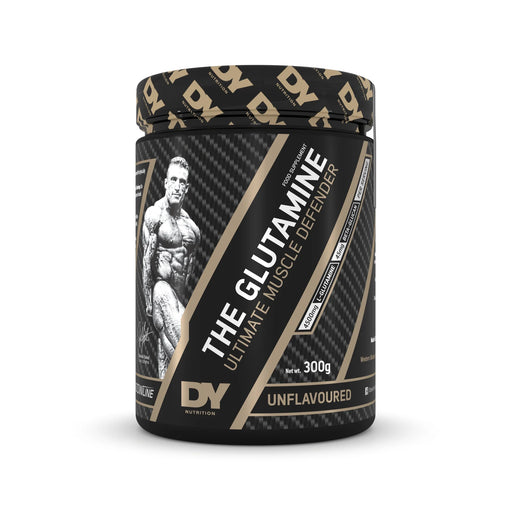 Jetzt 0% sparen
Jetzt % sparen
Original-Preis €22,90 - Original-Preis €22,90Original-Preis €22,90€22,90€22,90 - €22,90Aktueller Preis €22,90|/
Jetzt 0% sparen
Jetzt % sparen
Original-Preis €22,90 - Original-Preis €22,90Original-Preis €22,90€22,90€22,90 - €22,90Aktueller Preis €22,90|/The Glutamine · 300g
DY NutritionNo reviewsOptimierte Muskelregeneration: "The Glutamine" fördert effektive Erholung und Muskelaufbau außerhalb des Fitnessstudios. Expertenempfehlung: Do...
Vollständige Details anzeigenOriginal-Preis €22,90 - Original-Preis €22,90Original-Preis €22,90€22,90€22,90 - €22,90Aktueller Preis €22,90|/Jetzt 0% sparen Jetzt % sparen
Was ist Glutamin?
Glutamin ist eine natürlich in der Nahrung vorkommende semiessentielle Aminosäure. Semiessentiell bedeutet in diesem Zusammenhang, dass der Körper Glutamin bei Bedarf bis zu einem gewissen Grad aus anderen Aminosäuren selbst herstellen kann, wobei diese Menge jedoch in bestimmten Situationen eines erhöhten Glutamin Bedarfs nicht ausreicht, um den Bedarf des Körpers zu decken. Dies hat zur Folge, dass es Situationen wie Traumata oder extreme körperliche Anstrengungen gibt, in denen Körperproteine wie Muskelprotein abgebaut werden müssen, um zusätzliches Glutamin zur Verfügung zu stellen, wenn dem Körper keine ausreichenden Mengen an Glutamin über die Nahrung oder in Form von Supplements zugeführt werden.
Glutamin ist in seiner Struktur eng mit der Glutaminsäure verwandt. Sie können ineinander umgewandelt werden. Beim Mensch und allen Säugetieren kommt jeweils nur die L-Form dieser beiden Aminosäuren vor. Glutamin wurde 1883 aus Rübensaft isoliert, konnte aber erst 1932 aus Gliadin, einem Weizenprotein, isoliert und ein Jahr später chemisch synthetisiert werden. Die Glutaminsäure wurde 1866 aus Weizen isoliert und 1890 synthetisiert. Sie kommt vor allem in Pflanzenproteinen vor.
Diese können bis zu 45 Prozent an Glutaminsäure enthalten, andere Proteine haben dagegen oft nur Anteile von 10 bis 20 Prozent. Glutamin ist für den Zellstoffwechsel von Säugetieren sehr wichtig und kann als einzige Aminosäure die Barriere zwischen Blut und Hirn sehr schnell passieren. Es kann vom menschlichen Körper bei Bedarf in kleineren Mengen selbst hergestellt werden, wenn in der Ernährung Glutamin-reiche Quellen fehlen. Der größte Teil wird aber aus der Nahrung gewonnen.
Wofür benötigt der Körper Glutamin?
Der menschliche Verdauungstrakt ist auf Glutamin als Energiequelle angewiesen und auch für eine korrekte Funktion des Immunsystems werden ausreichende Mengen an Glutamin benötigt. Gleichzeitig verbraucht der Körper während intensiver Trainingseinheiten große Mengen an Glutamin, was zur Folge hat, dass die körpereigenen Glutaminspiegel nach dem Training um bis zu 50% reduziert sein können.
Aus welchen Gründen kann eine Glutamin Supplementation für Sportler von Vorteil sein?
Glutamin kann dem Körper während des Trainings als alternative Energiequelle für die trainierten Muskeln dienen und hierdurch Leistungsfähigkeit und Ausdauer der Muskulatur steigern. Da der Körper aus diesem Grund während einer intensiven Trainingseinheit große Mengen an Glutamin verbraucht, kann eine Glutamin Supplementation nach dem Training die Muskelregeneration beschleunigen und verhindern, dass der Körper Muskelprotein abbauen muss, um für andere wichtige Körperfunktionen benötigtes Glutamin zu erhalten.
Da Glutamin die Funktion des Immunsystems fördert, kann es Sportlern dabei helfen, sich besser vor Infektionskrankheiten wie Erkältung oder Grippe zu schützen, die unerwünschte Trainingspausen zur Folge haben können. Bei einer bereits vorhandenen Infektion kann Glutamin durch eine Anregung des Immunsystems dabei helfen, den Heilungsprozess zu beschleunigen. Als zusätzlichen Bonus kann Glutamin ähnlich wie Kreatin das Volumen der Muskelzellen erhöhen und den Muskeln ein volleres Erscheinungsbild verleihen, während es bei einer Einnahme auf nüchternen Magen die körpereigene Wachstumshormonproduktion um bis zu 400% erhöhen kann.
Was sind die Hauptvorzüge von Glutamin?
- Unterstützung der Regeneration nach dem Training
- Verhinderung eines Muskelabbaus, der zustande kommen kann, wenn der Körper mehr Glutamin benötigt, als er selbst herstellen kann oder über die Nahrung zugeführt wird
- Besitzt eine zellvoluminisierende Wirkung, die der von Kreatin ähnelt
- Kann bei einer Einnahme auf nüchternen Magen die körpereigene Wachstumshormonausschüttung um bis zu 400% erhöhen
- Unterstützung der Funktion des Immunsystems und Reduzierung der Anfälligkeit für Infektionskrankheiten
Glutamin und Glutaminsäure haben wichtige Funktionen im Körper
Glutamin ist diejenige Aminosäure, die im menschlichen Körper die höchsten Anteile hat und die wichtigste nicht essentielle Quelle für Stickstoff. Glutamin ist die Vorläufersubstanz von GABS, der Gamma-Aminobuttersäure. Diese ist ein Neurotransmitter im Gehirn, der auf die Nervenbahnen beruhigend und besänftigend wirkt. Bekannte Beruhigungs- bzw. Schlafmittel wie Benzodiazepine entfalten ihre Wirkung, indem sie GABS im Gehirn anregen. Von allen Aminosäuren hat Glutamin die höchste Konzentration im Blut und in den Muskelgeweben.
Es wird dort abgebaut, um Energie zu gewinnen. Glutamin ist allgemein die wichtigste Quelle für Energie in den Zellen. Es trägt zur Synthese von Genbausteinen bei. Daher haben alle Körperzellen, die sich häufig teilen bzw. erneuern, einen hohen Bedarf an Glutamin. Das gilt besonders für die Zellen der Darmwände und die Leukozyten (weiße Blutkörperchen). Auf diese Weise kann Glutamin auch das Immunsystem stärken, das gilt vor allem bei starken körperlichen Stressbelastungen.
Glutamin kann in der Leber zu Glukose umgewandelt werden, dies kann den Spiegel des Blutzuckers im Körper stabilisieren. Zusammen mit Cystein und Selen ist Glutamin außerdem ein Ausgangsstoff für die Bildung von Glutathion, ein lebenswichtiges Antioxidans im Gewebe. Die Glutaminsäure entsteht durch die Hydrolyse (Spaltung durch Wasser) von Proteinen.Die Umwandlung von Glutaminsäure zu Glutamin ist für die Regulation, den Abbau und die Ausscheidung von Ammoniak im Körper sehr wichtig.
Angereichert in der Muskelzelle, übt Glutamin einen osmotischen Druck aus, d.h. Glutamin hält Wasser im Muskel und schafft dadurch die Bedingungen für eine optimale Proteinsynthese. Entsprechend konnte in Studien nachgewiesen werden, dass die Muskelzelle bei Gabe von Glutamin in einen anabolen Zustand versetzt wird. Eine Gezielte Glutamin-Zufuhr nach körperlicher Belastung, kann Infektanfälligkeit bei Sportlern verringern. Interessanterweise kam es bei einer Studie zu einer Erhöhung des anabol und fettverbrennend wirksamen Wachstumshormons, sowie des Plasmabikarbonatspiegels, einem wichtigen Säurepuffersystem des Körpers.
Bikarbonat hilft, eine Lactatanhäufung im der Muskulatur, wie sie beim Training stattfindet, zu verringern, so dass vom Kraftsportler, der Glutamin vor dem Training zuführt, mehr Wiederholungen bewältigt werden können. Es kann den Wachstumshormon-Spiegel anheben, die Konzentrationsfähigkeit verbessern und möglicherweise das Verlangen nach Süßigkeiten reduzieren.
Die Hauptlieferanten von Glutamin und Glutaminsäure
Viele eiweißreiche Lebensmittel enthalten reichlich Glutaminsäure, beispielsweise Geflügel, Fisch und Gemüse, darunter besonders Rüben, Karotten und Rettich. Glutamin und GABS sind als spezifische Substanzen in Lebensmittel dagegen eher selten vorhanden.
Typische Gruppen für einen Mehrbedarf an Glutamin und Glutaminsäure
Bei physischen Belastungen, beispielsweise nach Verletzungen, Operationen und bei chronischen Krankheiten, besteht ein erhöhter Bedarf an Glutamin im Darm, in der Leber und im Immunsystem. Die körpereigene Bildung reicht dann nicht mehr aus, um den zusätzlichen Bedarf zu decken. Eine Ergänzung zusammen mit anderen Aminosäuren ist vor allem dann empfehlenswert, wenn die Proteinversorgung allgemein zu gering ist. Glutamin kann bei der Neigung zu Magengeschwüren und zur Gastritis aufgrund von zu hoher Aufnahme von Aspirin oder Alkohol vorbeugend wirken und dazu beitragen, Schäden an den Magenwänden zu verringern. Bei Alkoholismus kann Glutamin außerdem das Verlangen nach Alkohol verringern und Angstzustände senken.
Der Bedarf an Glutamin und Glutaminsäure kann bei folgenden Bedingungen, Beschwerden und Krankheiten erhöht sein:
- bei Leistungssport und harter körperlicher Arbeit
- bei starker physischer Belastung (z.B. durch Verletzungen, Operationen, Krankheiten)
- bei Neigung zu Magengeschwüren und Gastritis
- bei nervlicher Belastung und Anspannung
- bei hohem Alkoholkonsum
Kann man Glutamin und Glutaminsäure überdosieren oder gibt es Nebenwirkungen?
Bei relativ hohen Dosen (bis zu 21 Gramm täglich) sind von Glutamin keine toxischen Wirkungen bekannt. Zu hohe Dosen können eventuell Hautrötungen und Hautkribbeln auslösen. Menschen die an manischer Depression oder Epilepsie leiden, sollten hohe Dosen von Glutamin vermeiden. Sie können die Glutamatspiegel im Gehirn zu stark erhöhen. Dies kann die Manie oder Epilepsie eventuell verschlimmern. Monosodium-Glutamat (MSG) ist ein Monosalz der L-Glutaminsäure. Dieses kann als Zusatzstoff in Lebensmitteln (E620 - E625) eingesetzt werden. MSG wird häufig für das sogenannte "Chinasyndrom" verantwortlich gemacht. Bei sensibilisierten Menschen können nach dem Verzehr offenbar Herzklopfen und Kopfschmerzen auftreten.
Optimale Dosierung
Aufgrund der Rückmeldungen von Athleten, die Glutamin eingesetzt haben, scheinen folgende Einnahmeschemata ratsam:
- über den Tag verteilt 4-6 Dosierungen von jeweils 2-4g Glutamin
- vor und nach dem Training jeweils 5-10g Glutamin, oder
- die Zufuhr von 10-15g Glutamin sofort nach dem Training, sowie eineinhalb bis zwei Stunden später noch einmal 10-15g.
Bei Einnahme von Glutamin erfährt der Sportler eine verbesserte Regeneration, einen besseren Pump im Training, sowie eine leichte Zunahme der Körperkraft. Bei einigen Athleten kommt es innerhalb der ersten Einnahmetage auch zu einem Anstieg des fettfreien Körpergewichts, ähnlich, aber geringer, als bei der Zufuhr von Creatin. Dies dürfte auf die verstärkte Glykogeneinlagerung, sowie einen erhöhten Wassergehalt in der Muskulatur zurückzuführen sein.
Vorsichtsmaßnahmen und Warnungen:
Schwangerschaft und Stillzeit: Es ist nicht genug über die Sicherheit von Glutamin während Schwangerschaft und Stillzeit bekannt. Aus diesem Grund sollten schwangere und stillende Frauen sicherheitshalber auf Glutamin verzichten.
Schwere Lebererkrankungen mit Schwierigkeiten beim Denken oder Verwirrung (hepatische Encephalopathie): Glutamin könnte diese Erkrankung verschlimmern und sollte deshalb von Menschen, die unter dieser Krankheit leiden, nicht verwendet werden.
Natriumglutamat Überempfindlichkeit: Wenn man empfindlich auf Natriumglutamat reagiert, könnte es sein, dass man auch auf Glutamin empfindlich reagiert, da der Körper Glutamin in Glutamat umwandelt.
Manie oder mentale Störungen: Glutamin könnte bei Menschen, die zu Manie neigen, mentale Veränderungen hervorrufen.
Krampfanfälle: Es gibt Bedenken, dass Glutamin bei einigen Menschen das Risiko für Krampfanfälle erhöhen könnte. Aus diesem Grund sollten Menschen, die zu Krampfanfällen neigen, auf Glutamin verzichten.
Wechselwirkungen
Bei einer Kombination von Glutamin mit folgenden Medikamenten sollte man vorsichtig sein:
Lactulose
Lactulose hilft dabei, die Ammoniakspiegel im Körper zu senken. Glutamin wird im Körper in Ammoniak umgewandelt. Eine Einnahme von Glutamin in Kombination mit Laktulose könnte die Wirksamkeit von Lactulose reduzieren.
Krebsmedikamente (Chemotherapie)
Es gibt Bedenken, dass Glutamin die Wirksamkeit einiger Krebsmedikamente reduzieren könnte. Es ist zu früh, um eine Aussage darüber treffen zu können, wie diese Interaktion zustande kommt.
Medikamente, die zur Verhinderung von Krampfanfällen verwendet werden (krampflösende Medikamente)
Medikamente, die verwendet werden, um Krampfanfälle zu verhindern, beeinflussen bestimmte Chemikalien im Gehirn. Auch Glutamin könnte Chemikalien im Gehirn beeinflusse. Hierdurch könnte Glutamin die Wirkung von Medikamenten, die verwendet werden, um Krampfanfälle zu verhindern, reduzieren.
Glutamin kaufen
Glutamin ist in verschiedenen Darreichungsformen erhältlich. Neben Kapseln erfreut sich die Pulverform der größten Beliebtheit, da man dieses problemlos mit anderen Supplements wie Proteinpulver mischen kann. Alternativ kann das Pulver in Wasser oder Saft gelöst werden.
Wie bei anderen Supplements auch, sollte vor allem die enthaltene Menge des Wirkstoffs – in diesem Fall Glutamin – als Qualitätsfaktor herangezogen werden.
Das 100% Pure L-Glutamine von B.A.M., die Hospitaller Glutamine Sword Brothers von Gods Rage oder die Glutamine Polyhydrate aus dem Hause GN Laboratories zählen aus diesem Grund zu unseren Bestsellern.
Referenzen
- J Appl Physiol. 1999 Jun;86(6):1770-7. Effect of oral glutamine on whole body carbohydrate storage during recovery from exhaustive exercise. Bowtell JL, Gelly K, Jackman ML, Patel A, Simeoni M, Rennie MJ.
- Am J Surg. 2002 Apr;183(4):471-9. Reversal of cancer-related wasting using oral supplementation with a combination of beta-hydroxy-beta-methylbutyrate, arginine, and glutamine. May PE, Barber A, D'Olimpio JT, Hourihane A, Abumrad NN.
- Curr Opin Clin Nutr Metab Care. 2002 Jan;5(1):69-75. Glutamine: clinical applications and mechanisms of action. Neu J, DeMarco V, Li N.












